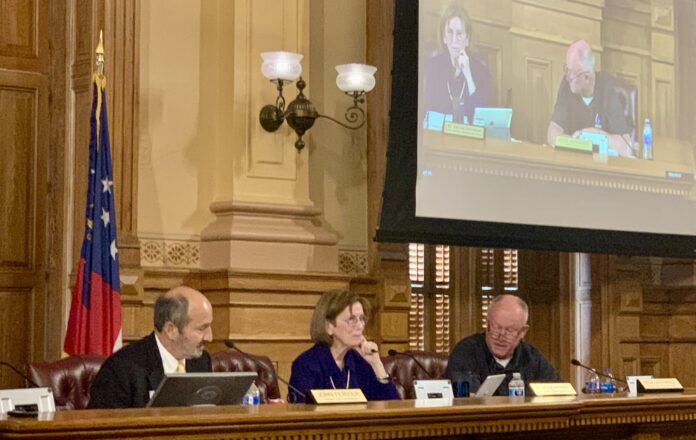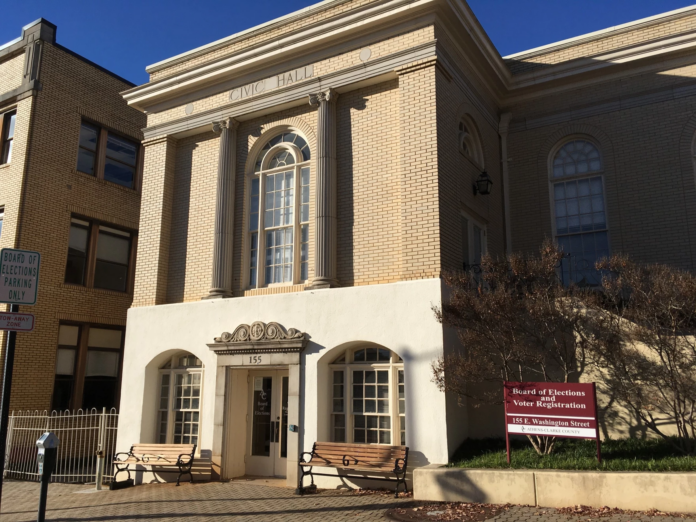(Georgia Recorder) — The deaths of two Georgia women have reignited the debate over the state’s abortion restrictions that took effect two years ago and put a new focus on an exception in the law that purports to protect mothers when their own health is imperiled.
Georgia’s abortion law, which bans most abortions after about six weeks, was passed in 2019 but did not take effect until one month after the U.S. Supreme Court overturned the constitutional right to an abortion. The law includes a few narrow exceptions, including in the case of a “medical emergency” that threatens the life of the mother.
New reporting from ProPublica this week has uncovered two maternal deaths that happened in the first few months after the law took effect. Both deaths were officially deemed preventable by the state’s Maternal Mortality Review Committee, according to ProPublica, which also reported that the committee that reviews maternal deaths has only examined deaths through the fall of 2022.
One woman, 28-year-old Amber Thurman, attempted to terminate her pregnancy using abortion medication from a clinic in North Carolina. But when she experienced a rare complication and went to an Atlanta-area hospital for treatment, the doctors waited 20 hours to perform a dilation and curettage, or D&C, to treat sepsis that resulted from an incomplete abortion.
In the second case, 41-year-old Candi Miller, who had multiple chronic conditions, including lupus, also experienced a complication from abortion medication, but she did not seek medical care. Doctors had told the mother of three that it would be dangerous for her to have another baby.
The revelations sparked condemnation from reproductive rights supporters, who have long warned of such dire outcomes.
“These women did nothing wrong except live in a state where access to critical reproductive healthcare is unjustly restricted and where we have one of the highest maternal mortality rates in the country,” said Planned Parenthood Southeast spokesperson Jaylen Black.
“These heartbreaking deaths are not isolated incidents but a grim warning of more to come,” Black said.
Democratic presidential candidate and Vice President Kamala Harris announced a trip to Georgia Friday to talk about reproductive freedom, which is an issue she has put at the center of her campaign. Her visit comes days after GOP vice presidential candidate J.D. Vance celebrated the 2022 decision overturning Roe v. Wade during a visit to Georgia.
“This is exactly what we feared when Roe was struck down,” Harris said in a statement after the story about Thurman was published.
Anti-abortion advocates, though, say the deaths are not a failing of the state’s law and have argued that they instead highlight the risks attached to abortion medication.
“This young mother was killed by a nine-week chemical abortion that Georgia banned in 2019 because it is dangerous for women and deadly for their children,” said state Sen. Ed Setzler, an Acworth Republican who sponsored the abortion measure in 2019. “Georgia’s law gave these shamefully unprepared doctors every legal tool they needed to save this mother’s life.”
Complications from medication abortion, which has been the most common way to terminate a pregnancy since 2020, are rare.
A spokesman for Georgia Gov. Brian Kemp also defended the law. Kemp, a Republican, signed the abortion ban into law.
“Georgia’s LIFE Act not only expanded support for expectant mothers but also established clear exceptions, including providing necessary care in the event of a medical emergency. In Georgia, we will always fight for and protect the lives of the most vulnerable among us,” said Kemp spokesman Garrison Douglas.
Some have bristled at the blame being pinned on the state’s law.
“It’s not fair to make that connection because it clearly was not in the law to deny any kind of service this way, and who ought to be ashamed of themselves are these people that are lying about this bill,” said Martha Zoller, who is a conservative radio host, pundit and Georgia Life Alliance board member.
“There is no situation where this woman should have been denied care,” she added, referring to Thurman.
‘The stakes are exceptionally high’
Georgia’s law allows for an abortion to be performed when there is a “medical emergency,” but representatives of the medical community have cautioned for years that the law’s wording is unclear and would cause doctors to delay care until the patient is in an obvious crisis.
Specifically, a medical emergency is defined as “a condition in which an abortion is necessary in order to prevent the death of the pregnant woman or the substantial and irreversible physical impairment of a major bodily function of the pregnant woman.”
The procedure would also be allowed when a fetus is deemed “medically futile.”
If a physician violates the law, they risk losing their license. They could also face up to a decade in prison.
It’s the combination of the vague wording and high personal stakes for the medical providers that create a situation where a patient like Thurman can fall through the cracks, said Greer Donley, an associate professor of law at the University of Pittsburgh who is a national expert on abortion.
“They’re afraid that if they act too quickly, they could lose their freedom, their vocation, everything – like the stakes are exceptionally high,” Donley said. “And so, you have to understand when you think about the vague laws, how you would act, how any rational person would act when those are the stakes of trying to understand vague laws.”
But she also said in Thurman’s case, the risk of prosecution would have been low since the fetus was deceased when Thurman arrived at the hospital. Doctors met at least twice to discuss whether to perform a D&C, according to ProPublica.
Still, Georgia’s law is not crystal clear on that point either, Donley said. The law says it is not an abortion to remove a dead fetus if the fetus died because of a spontaneous miscarriage. Couple that with another definition that defines an abortion as a procedure where a physician intends to end a pregnancy. This would suggest performing a D&C in Thurman’s case would have not been considered an abortion, she said.
“This just shows you the types of questions that have to be answered at the very outset, like whether it was an abortion at all, and then from there, the next question becomes, if it’s an abortion, at what point is her health in such great risk that the medical exception kicks in,” Donley said.
Still, Donley said, despite the ambiguity, it is clear that the doctors should have acted in Thurman’s situation.
Dr. Susan Bane, vice chair of the American Association of Pro-Life Obstetricians and Gynecologists, who practices in North Carolina, said details in ProPublica’s reporting suggest it would have been quickly obvious to any doctor that Thurman was suffering from an infection.
“So all of those things together, I think 100% of board-certified OB-GYNs in this country like myself would have said, ‘I have got to start antibiotics and get this woman a D&C and get this infected tissue out of her,’” Bane said.
“And the fact that it was delayed overnight – they report 20 hours – she just got sicker and sicker and sicker, and this is medical negligence. It’s not following the standard of care,” she added.
But Bane disagrees that the language in the laws is vague. Rather, she blamed messaging around abortion laws for any confusion.
“The chaos and the confusion is being blamed on the laws, but it’s really the lack of implementation of the laws. It’s the lack of clarity from organizations,” she said, referring to professional groups. “And I have to say, there’s negligence in some of the reporting that’s out there. Over and over, I’m hearing stories that are scaring women and scaring doctors that they can’t do their job. They can’t take care of women with ruptured membranes, their previable babies; they can’t take care of women with miscarriages or ectopics. There’s not a single law in the country that doesn’t allow that.”
Whether the language in the law is clear has become a bit of a Rorschach test, said state Rep. Michelle Au, a Johns Creek Democrat who is an anesthesiologist.
Supporters of the law argue the wording is clear and protects the health of mothers, but others like Au say the law is out of step with how medical care is practiced in the real world.
“I think that people like to believe – because they want to oversimplify this and want to believe there are easy answers – that there is some sort of indicator that starts flashing red or some sort of metric that crosses a threshold that makes it completely obvious when care is required, when a patient’s life is in danger, or when organ damage is irreversible,” Au said.
To Au, the bigger issue is the legal environment the law has created and how that affects the medical decisions that are being made when the goal should be preventing a patient’s condition from worsening.
“I think it feels easy and reassuring to quickly judge ‘Obviously this was life threatening,” Au said of Thurman’s case. “The way we knew it was life threatening is because she’s dead.
“Some assessments are made in retrospect only, and when you are putting people in a position of choosing between minimizing patient harm, avoiding what might be considered malpractice and having to abide by an unclear legal regime, it is very difficult, and you are pushing people to forestall these decisions up until the limit,” she said.
Au said Thurman and Miller likely represent the “first wave of patients who have been harmed by this law.”



















